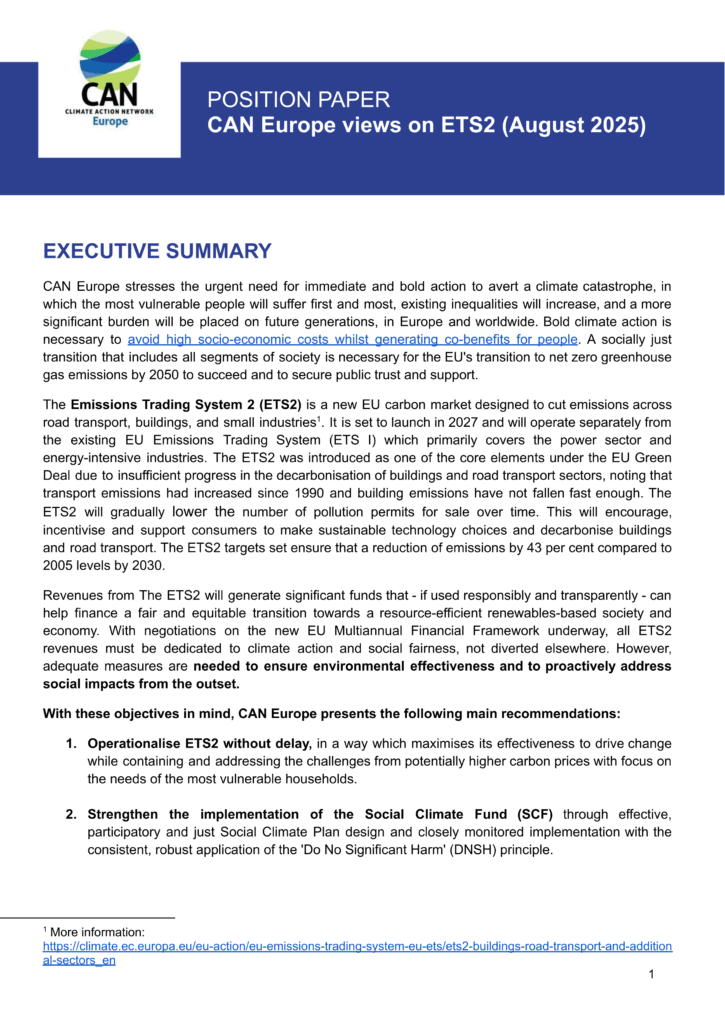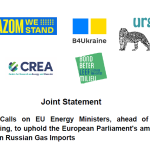See the full position paper: 📥 CAN Europe views on ETS2
EXECUTIVE SUMMARY
CAN Europe stresses the urgent need for immediate and bold action to avert a climate catastrophe, in which the most vulnerable people will suffer first and most, existing inequalities will increase, and a more significant burden will be placed on future generations, in Europe and worldwide. Bold climate action is necessary to avoid high socio-economic costs whilst generating co-benefits for people. A socially just transition that includes all segments of society is necessary for the EU’s transition to net zero greenhouse gas emissions by 2050 to succeed and to secure public trust and support.
The Emissions Trading System 2 (ETS2) is a new EU carbon market designed to cut emissions across road transport, buildings, and small industries. It is set to launch in 2027 and will operate separately from the existing EU Emissions Trading System (ETS I) which primarily covers the power sector and energy-intensive industries. The ETS2 was introduced as one of the core elements under the EU Green Deal due to insufficient progress in the decarbonisation of buildings and road transport sectors, noting that transport emissions had increased since 1990 and building emissions have not fallen fast enough. The ETS2 will gradually lower the number of pollution permits for sale over time. This will encourage, incentivise and support consumers to make sustainable technology choices and decarbonise buildings and road transport. The ETS2 targets set ensure that a reduction of emissions by 43 per cent compared to 2005 levels by 2030.
Revenues from The ETS2 will generate significant funds that – if used responsibly and transparently – can help finance a fair and equitable transition towards a resource-efficient renewables-based society and economy. With negotiations on the new EU Multiannual Financial Framework underway, all ETS2 revenues must be dedicated to climate action and social fairness, not diverted elsewhere. However, adequate measures are needed to ensure environmental effectiveness and to proactively address social impacts from the outset.
With these objectives in mind, CAN Europe presents the following main recommendations:
- Operationalise ETS2 without delay, in a way which maximises its effectiveness to drive change while containing and addressing the challenges from potentially higher carbon prices with focus on the needs of the most vulnerable households.
- Strengthen the implementation of the Social Climate Fund (SCF) through effective, participatory and just Social Climate Plan design and closely monitored implementation with the consistent, robust application of the ‘Do No Significant Harm’ (DNSH) principle.
- Introduce complementary measures:
- Provide complementary investments and measures focusing on vulnerable households beyond the SCF, financed by Member States from their ETS revenues and other EU Funds, and in addition to available funding for climate action;
- Integration of ETS2 in a comprehensive and coherent policy mix reducing emissions from transport and energy, while harnessing multiple socio-economic benefits;
- Take structural action with measures to address the inequality root causes of energy and transportation poverty;
- Implement fair redistribution measures, including by reforming national tax systems, introducing levies on high-emission sectors and wealth concentration, and phasing out environmentally harmful subsidies and taxes that slow down the shift from fossil fuel based transport and heating to electrified and renewables-based alternatives.
If these steps are taken, ETS2 and the SCF will be essential tools to achieve the EU’s climate targets while addressing social equity. Delaying ETS2 would not lead to better investment outcomes but would instead hinder the momentum needed to transform Europe’s energy and transport landscape. Prompt, inclusive, and well-structured implementation is both possible and necessary.
See the full position paper: 📥 CAN Europe views on ETS2




